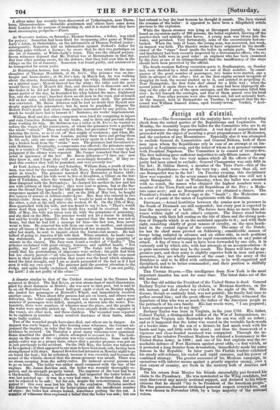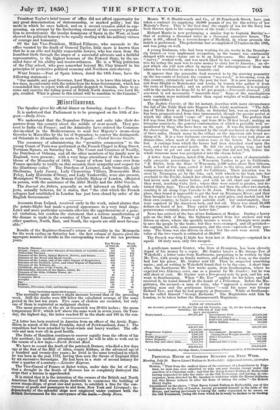intrigu nub tennial.
FRANCE.—The Government and the majority have received a puzzling- check from the united parties of the Republicans and Legitimists. On Monday, the Assembly began the ballot for the Committee who are to sit in permanence during the prorogation. A vast deal of negotiation had proceeded with the object of securing a great preponderance of Moderates, and the exclusion of any Mountaineer. Especially, also it was attempted to exclude General de Lamoriciere and General 13edeau, both of them men upon whom the Republicans rely in case of an attempt at an Im- perialist or Legitimist coup, and the latter of whom is at personal variance with President Napoleon. The Committee is to consist of twenty-five. The first balloting gave sufficient majorities to only fifteen names. Among these fifteen were the two very names which all the efforts of the ma- jority had been aimed to exclude ; General Changarnier was only fifth in the list; K. Odilon Barrot, a member of the Tiers Parti—that of the Moderate Republicans—was at the very top ; and, worse than all, not one Bonapartist was in the list ! On Tuesday evening, this disciplinary blow was repeated : in the seven names then added there was still not a single Bonapartist. And on Wednesday, when the ballot was attended_ with no result, the names who obtained the highest numbers were a member of the Tiers Psi-ti and an old Republican of the Eve • a Mode- rate came next; and no Bonapartist even yet obtained a chance. The President's friends are full of rage at the "insult"; the Moderates are in a sort of panic at the union of Legitimists with the Mountain.
Dinotans.—Actual hostilities between the armies now in presence in the South of Denmark are still suspended; but every post is expected to bear the narrative of a battle. The forces have done no more than ad- vance within sight of each other's outposts. The Danes stand before Flensburg, with their left resting on the isle of Alsen and the strong posi- tion of Duppeln which is on the mainland opposite to it ; and with their right, consisting chiefly of great masses of cavalry, on the open heath- land in the central region of the country. The army of the Dutch- ies has its chief mass pivoted on Schleswig; considerable masses of troops being radiated in advance and on either side, in such positiona as may afford tactical advantages for rapid concentration on any point of attack. A flag of truce is said to have been forwarded by one side, it is. variously said by which side, with last attempts at an accommodation : it is quite uncertain what may be the result. The Danes will have the ag- gressive part, and their army is slightly superior both in men and guns ; moreover, they are wholly masters of the coast : but the army of the Dutchies is said to be filled with enthusiasm, to be well-organized and disciplined, and to be better commanded; and their position is skilfully adapted for defence. THE Efirrrzn STATES.—The intelligence from New York is the most important America has sent for some time. The latest dates are of the 9th instant.
The fine old soldier the President of the United States is dead. General Zachary Taylor was attacked by cholera, or Mexican diarrhcea, on the 8th instant, and died about ten o'clock in the night of the 9th. His disease, though so suddenly fatal, was not painful; his family had time to gather around him; and the great officers of the Republic witnessed the departure of him who was as much the father of the American people as the patriarch of his own family. His last words were, "I am prepared ; I have endeavoured to do my in Zachary Taylor was born in Virginia, in the year 1786. His father, Colonel Taylor, a distinguished soldier of the War of Independence, re- moved from Virginia into Kentucky when his son was still an infant ; and so it happened that the latter was reared in the veritable back-woods of a border state. As the son of a farmer, he had much work with his hands and legs, and little with his mind ; and thus the framework of a vigorous and clear-headed manhood was compacted. Through the in- fluence of his relative President Madison he obtained a lieutenancy in the United States Army, in 1808; and one of his first exploits was the re- markable defence of Fort Harrison against great odds,—a feat which, as it protected a long frontier from devastation, immediately made his name famous in the Republic.- In later years the Florida warfare exhibited his steady self-reliance, his varied and rapid resource, and his power of combined strategy. The greater successes of his Mexican campaign, in operations with inferior means against a greatly superior enemy, over a vast extent of country, are fresh in the memory both of America and Europe. On his return from Mexico his friends successfully put forward his claim to the Presidency. He was nominated as the Whig candidate, but soon disavowed any merely sectional support, and declared to his fellow citizens that he should "try to be President of the American people." His fine generous character awakened personal respect everywhere, and he was chosen in November 1848, by a large majority of the national voices.
President Taylor's brief tenure of office did not afford opportunity for any great demonstration of statesmanship, or marked polity ; but the mode in which he once balked, and on a second occasion aided in sup- pressing, an attempt by the freebooting element of his country's popula- tion to revolutionize the insular dominions of Spain in the West, at least showed his political honesty to be equally sterling with his military virtues of courage and humanity.
Of the late Vice-President, Millard Fillmore, who succeeds to the office vacated by the death of General Taylor, little more is known than that he is an able and highly respectable lawyer, who has risen from the humblest birth through the stages of a successful advocate and a faithful representative, to the highest honours of the Federal State, by the un- aided force of his ability and trustworthiness. He is a Whig politician of the Clay school, who goes somewhat beyond Mr. Clay himself in his principles of protective political economy and Northern anti-slavery.
WEST INDIES. —Port of Spain letters, dated the 18th June, have the following statement-
" Our amiable and good Governor, Lord Harris, is to leave this island in a few days, inconformity with the orders from the home Government, which has commanded him to repair with all possible despatch to Canada, there to as- sume and exercise the ruling power of British North America, vice Lord El- gin, recalled. What is gloom to this island will be sunshine to the Canadair."



























 Previous page
Previous page